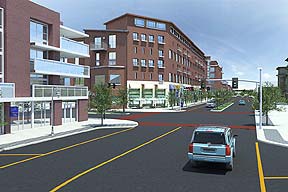- Cities are tearing down — or thinking about tearing down — urban freeways to undo the damage to neighborhoods. But the $1 billion in the federal infrastructure law for such endeavors isn't even enough to demolish one freeway. (The B1M)
- McKinsey lays out how transit can become more inclusive for women, seniors and people with disabilities.
- Without renewable energy, emissions from generating power to charge electric vehicles will wipe out half the gains from switching to EVs. (Inverse)
- More evidence that autonomous vehicles won't be good for the environment if they lead to more driving. (GreenBiz)
- Suspending gas taxes is a politically popular idea, but most drivers probably wouldn't even notice a price drop at the pump. (Route Fifty)
- Developing nations have an opportunity to build transportation infrastructure for people, not cars. (The City Fix)
- California has big plans for sustainable, equitable transportation, but will it stick with them? (Transit Center)
- A San Francisco assemblyman reintroduced a bill to decriminalize jaywalking in California. (NBC Bay Area)
- A $400 million bond issue for San Francisco transit agency Muni will be on the ballot in June. (Railway Age)
- Utah legislators are considering bringing state-funded transit projects under control of the state DOT, which currently focuses almost exclusively on car infrastructure. (Salt Lake Weekly)
- A strike by concrete workers is delaying construction on Seattle transit projects. (KIRO)
- Eight new cameras in Seattle will automatically ticket drivers who block crosswalks and bus lanes. (Fox 13)
- The pedestrian-friendliness of downtown Minneapolis and St. Paul streets varies widely from block to block. (MSP Mag)
- Pennsylvania Avenue between the Capitol and the White House could become a complete street. (DCist)
- Montgomery County, Maryland, can improve access to transit by making stations more walkable. (Brookings)
- WVXU has a podcast on how Cincinnati's bike infrastructure is progressing.
- A UK cycling group released a master plan for a nationwide biking and walking network, but at this rate it could take 150 years to complete. (The Guardian)
Streetsblog
Friday’s Headlines to Wrap Up the Week

One rendering of the proposed boulevard that would replace the Inner Loop East. Image: City of Rochester
Stay in touch
Sign up for our free newsletter
More from Streetsblog USA
Friday Video: The London Neighborhood Where Bikes Outnumber Cars
...and how they got to that impressive milestone.
Friday’s Headlines Battle Galactus
Like the Marvel supervillain, U.S. interstate highway system seems to eat up everything in his path. A new book explores how to stop it.
New Report Shows Pedestrian Fatalities Drop — But Experts Say Not Enough
The Governors Highway Safety Association report showed a 4 percent drop in the number of pedestrian deaths last year, putting a slow on a dangerous trend — but advocates say the drop isn't nearly big enough.
Talking Headways Podcast: Localities Subsidize the State DOT
Adie Tomer of Brookings on how to improve regional coordination around infrastructure.
Five of the Ugliest Transportation Policies In the ‘Big, Beautiful’ Bill
Here's a rundown of some of the transportation provisions in the Republicans' reconciliation package, and what they might mean for your community.
Viva La Thursday’s Headlines
Why is French transit ridership up 10 percent since before the pandemic, while American transit ridership is down 23 percent?





